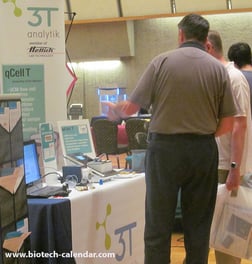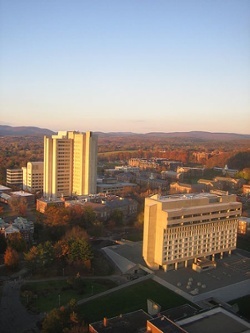 Tuberculosis (TB) is an infectious disease that affects nearly 1/3 of the world's population. Although eradication efforts have been undertaken, none have been successful and TB is still a leading cause around the world. Even though there are treatment methods for this infection, they are not always successful at killing the bacteria that cause TB. This provides life science researchers with more questions and research topics, to better understand the infection and bacteria and what causes treatments to work occasionally, but not always
Tuberculosis (TB) is an infectious disease that affects nearly 1/3 of the world's population. Although eradication efforts have been undertaken, none have been successful and TB is still a leading cause around the world. Even though there are treatment methods for this infection, they are not always successful at killing the bacteria that cause TB. This provides life science researchers with more questions and research topics, to better understand the infection and bacteria and what causes treatments to work occasionally, but not always
A researcher from the University of Massachusetts, Amherst was recently awarded $2.3 million from the National Institutes of Health (NIH) to further research on the bacteria that cause TB.
Sloan Siegrist, a microbiologist at UMass, has been awarded the NIH New Innovator Award that will fund her research for the next five years. Siegrist will be using this grant to study the bacteria known to cause TB - Mycobacterium tuberculosis (Mtb). Previous research has shown that using antibiotics to fight Mtb in a petri dish vs. in a human have drastically different timelines - it takes about 6 months longer for the antibiotics to work in humans than in the petri dish. Siegrist will work to gain a better understanding of what causes this vast difference. The rates at which Mtb grow at different stages of TB infection is another focus of her research, since it is difficult to see the bacteria growing but it is believed amongst researchers that this growth happens.
For her research, Steigrist and her Amherst team will further develop a probe they have been working on. This fluorescent molecular probe, when added to Mtb, is only absorbed when the bacteria are actively growing and dividing, providing new insight into how the bacteria grow that will help with further antibiotic development.
"It's surprisingly difficult to tell whether the cells are growing or not, and traditional methods take a very long time," Steigrist explained. With the help of these probes, which the team will continue to develop over the next several years, they hope to be able to receive information on the cell growth in a much quicker time frame than previous methods provide.
 The University of Massachusetts, Amherst is a thriving life science research marketplace that receives millions of dollars annually from public and private institutions to support ongoing research and to establish new research buildings and centers. UMass currently has $39 million in active funding from the NIH that is benefiting life science research across the campus. Research projects on campus benefiting from this funding include:
The University of Massachusetts, Amherst is a thriving life science research marketplace that receives millions of dollars annually from public and private institutions to support ongoing research and to establish new research buildings and centers. UMass currently has $39 million in active funding from the NIH that is benefiting life science research across the campus. Research projects on campus benefiting from this funding include:
- UMass, Amherst Opens $150 Million for Applied Life Sciences
- University of Massachusetts: $4M Grant for Plant Stem Cell Research
- Research Grant to UMass to Help Uncover How the Brain Works
Life science researchers in this thriving Amherst marketplace have the means and the need for the best and newest tools and technologies that will further their lab work. Biotechnology Calendar, Inc. holds an annual BioResearch Product FaireTM Event in Amherst, MA that provides laboratory product suppliers the opportunity to meet face-to-face with active researchers interested in discovering new products and technologies available to use in their labs. (Image courtesy of Wikimedia Commons)
The 4th Annual BioResearch Product FaireTM Event is coming up on August 3rd, 2018 and more than 150 researchers are expected to attend. This is the premiere opportunity for lab suppliers to market products to active researchers, and is an education opportunity for life science researchers to find new lab supplies.
To learn more about participating in this event, visit the link below:
to see other upcoming events click below:



